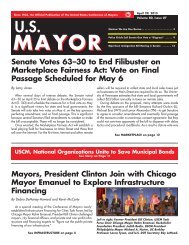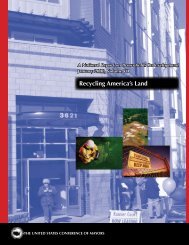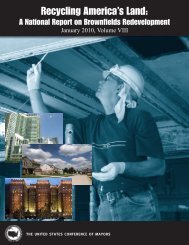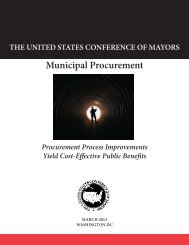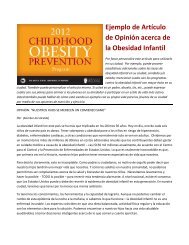Writing Proposals for HIV/AIDS Prevention Grants - U.S. Conference ...
Writing Proposals for HIV/AIDS Prevention Grants - U.S. Conference ...
Writing Proposals for HIV/AIDS Prevention Grants - U.S. Conference ...
Create successful ePaper yourself
Turn your PDF publications into a flip-book with our unique Google optimized e-Paper software.
2 TECHNICAL ASSISTANCE REPORTS March 2003Be<strong>for</strong>e You BeginPreparing a proposal can be an extremely time-consumingprocess, particularly <strong>for</strong> CBOs and local healthdepartments that do not have full-time proposal-writingstaff. Following are some basic guidelines to considerbe<strong>for</strong>e responding to a funding announcement:• Read the funding guidelines and directions carefully.Most funding announcements contain fairly detailedin<strong>for</strong>mation about funding priorities, eligibility criteria,and submission requirements. Federal agencies, inparticular, have complex application requirementsthat must be followed exactly or the proposal maybe disqualified.• Make sure you have enough time to prepare the proposal.Funders’ deadlines are usually non-negotiable. Berealistic about how much time the proposal will takeyour agency to prepare given your current resourcesthen decide whether it’s worth the ef<strong>for</strong>t. If you don’thave time to do it properly, don’t do it at all.• Consider whether the grant is right <strong>for</strong> your organization.Even if your organization meets general fundingcriteria, it may not be the right “fit” <strong>for</strong> a particulargrants program. Following are some questions anapplicant may want to ask be<strong>for</strong>e beginning theapplication process:• Is the proposed program consistent with the missionand goals of my organization?• Does my organization currently have the staff expertiseand resources to implement the program?• Does my organization have the capacity to administerthe funds that it is applying <strong>for</strong>?• Does my organization have direct ties to andexperience with the target population?• Is there community support <strong>for</strong> the proposedprogram?• Is the amount of money being offered worth thetime and expense involved in applying <strong>for</strong> it?• If possible, discuss your proposed program with thefunder be<strong>for</strong>e writing the proposal. Some funders, likeUSCM <strong>for</strong> example, are willing to discuss yourproposed program by phone or to respond to yourletter of inquiry (a letter that briefly describes yourproposed program and the need that it addresses–see box to the right). In fact, some private fundersrequire you to go through a screening process be<strong>for</strong>esubmitting a proposal. Take advantage of any opportunitiesyou have to get feedback from a funderbe<strong>for</strong>e submitting a proposal. Making sure, upfront,that your program is a logical fit with a particularfunder will save you a lot of time and trouble inthe long run.• Consider collaborating with other organizations. Manyfunders, particularly federal agencies, prefer proposalsthat involve collaboration between two or moreorganizations because they avoid duplication of ef<strong>for</strong>tand enhance the capacity of the applicant to serveclients. You may increase your chances of beingselected <strong>for</strong> funding if you pair up with anotherorganization, particularly when your areas of expertisecomplement each other.TECHNICAL ASSISTANCE REPORTS (TAR), is an official publication of the Health Programs of The United States <strong>Conference</strong>of Mayors (USCM) and is a product of the <strong>HIV</strong>/<strong>AIDS</strong> Program, funded by the U.S. Centers <strong>for</strong> Disease Control and <strong>Prevention</strong> (CDC)under grant #U62/CCU300609-19. However, any opinions expressed herein do not necessarily reflect the policies of CDC.Thomas M. Menino, Mayor of Boston, serves as USCM President, Irma L. Anderson, Mayor of Richmond (CA), is Chair of the StandingCommittee on Children, Health and Human Services. USCM executive officers with responsibility <strong>for</strong> Health Programs are: J. ThomasCochran, Executive Director, and Crystal D. Swann, Director of Health Programs. This publication was prepared by Elizabeth Kresse,M.A., Senior Staff Associate with assistance from Laurence Tate, <strong>Grants</strong> Manager, and Dora Marcus, Ph.D., evaluation consultant.© The United States <strong>Conference</strong> of Mayors, March 2003The United States <strong>Conference</strong> of Mayors • 1620 Eye Street,NW • Washington, DC 20006 • (202) 293-7330www.usmayors.org/uscm




